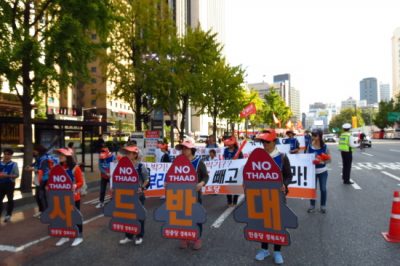South Korean Progressive Parties Merge to Complete Candlelight Revolution

Featured image: Signs read: “We oppose THAAD”; Photo – Tongil News
“World without precarious labor, world without war!”
On October 15, ten thousand people gathered in Seoul Plaza in front of Seoul City Hall to celebrate the launch of a new progressive party. The Minjung (People) Party is the amalgamation of two left-leaning parties, the New Progressive Party and the United People’s Party (Minjung Yonhap Party), and is a party of workers, farmers, urban poor, women and youth resolved to complete the “candlelight revolution” that ousted Park Geun-hye earlier this year.
The formation of the Minjung Party is the first regathering of progressive forces since the forced dissolution of the Unified Progressive Party by the former Park Geun-hye administration in 2014. The party’s two stated priorities are establishing lasting peace on the Korean peninsula and the eradication of precarious labor.
In a statement read by the two standing representatives of the party — Kim Jong-hun and Kim Chang-han — the Minjung Party criticized the current administration for following the lead of the United States in reinforcing a hostile policy on North Korea and vowed to challenge domestic policies that prioritize the wealthy over the majority. It added:
The people are at the base of the politics that we strive for. Without the support, strength, and wisdom of the people, progressive politics has no chance of moving forward. The greatest political task in front of us is politics for the people and arousing people to come together in a political convergence.
The statement concluded,
“People! Let us create a new Korea, a peaceful unified homeland, in which those who toil and sweat receive respect.”
Overseas Koreans and notable figures around the world sent messages of congratulations to the newly formed Minjung Party. Noam Chomsky wrote,
“The launch of the new Minjung Party is encouraging to the struggles for justice, and it is meaningful progress towards democratization grounded in the participation of the people.”
He also expressed hope for the new party to forge a peaceful path out of the grave war threats currently endangering the Korean Peninsula and the world.
Following the ceremony, the new members and supporters of the Minjung Party marched through Seoul.

Banner reads: “World without precarious labor, world without war. Together with the Minjung Party.” Photo – Tongil News

Sign reads: “Sign the Peace Treaty”; Photo – Tongil News

Super market workers marching with carts demanding “Completely abolish precarious labor”; Photo – Tongil News
On October 19, members of the Minjung Party held a press conference in front of the U.S. Embassy in Seoul to speak out against the most recent military exercises held by the U.S. and South Korean naval forces. They demand a stop to the joint naval exercises and a start to dialogue for peace.
The joint naval drills began on Monday October 16. The exercises included the deployment of the nuclear-powered aircraft carrier USS Ronald Reagan along with other nuclear strategic assets including a dozen destroyers with missile capabilities as well as F-22 and B1B bombers. The USS Ronald Reagan will likely remain off the coast of the Korean peninsula through Donald Trump’s visit to South Korea on November 7.
Representatives of the Minjung Party noted that the so-called “exercises” are akin to threatening a preemptive strike against North Korea. They warned U.S. President Donald Trump —
“We will not tolerate any action that threatens peace.”
The party representatives also called on South Korean President Moon Jae-in to stand up to the U.S. government and assert South Korea’s right to self-determination and peace.

